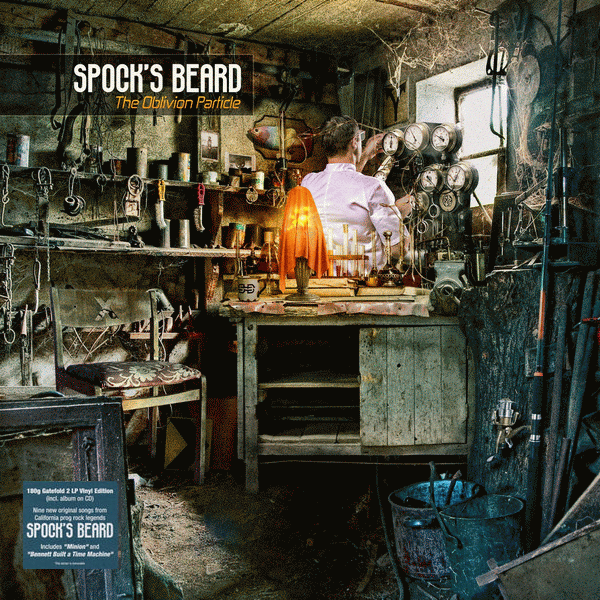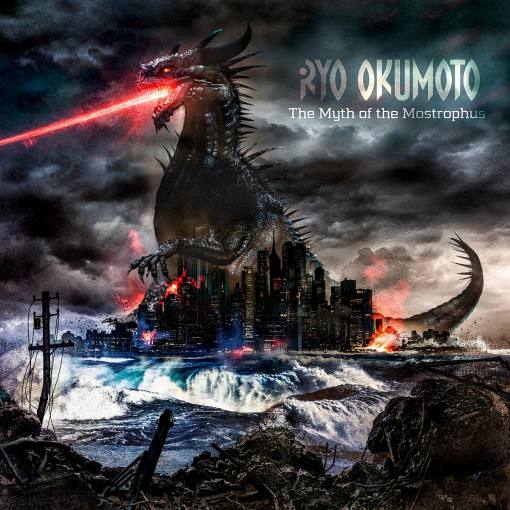SPOCK’S BEARD – The Oblivion Particle (2015)
*
Today August 21 finds progressive heroes SPOCK’S BEARD returning with “The Oblivion Particle“, the band’s twelfth studio album which sees them drawing from their core essence while stretching out into some exciting new territory.
If until now 2015 was already a strong year for progressive rock music, it is just about to get even stronger, thanks to this little beauty of an album. Over the years, despite one or two alterations to the line-up, Spock’s Beard have consistently released music of the highest caliber. Rightly so, this has ultimately led to theirs becoming a name synonymous with ‘quality’ within the genre.
Spock’s Beard 2015 is comprised of Alan Morse (vocals, guitar), Dave Meros (bass, vocals), Ryo Okumoto (keyboards, vocals), Jimmy Keegan (drums, vocals) and Ted Leonard (vocals, guitar).
And, with “The Oblivion Particle”, the quintet may just have delivered their best album yet.
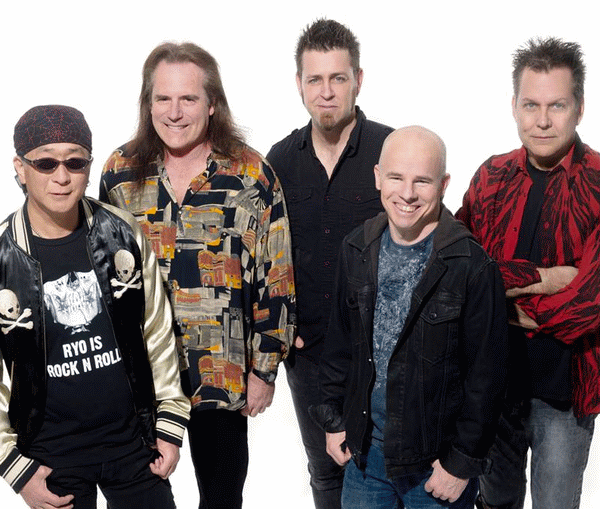
The CD opens with arguably the most ‘normal’ and traditional of Spock’s Beard compositions, ‘Tides Of Time’. The track is full of complexity but never at the expense of the song. It is a cut that contains a really nice tempo and flow, strong melodies and some rich keyboard tones that give the whole thing an almost theatrical pomp as it develops, ebbing and flowing dextrously from one idea to the next. In addition, the vocals of newish recruit Ted Leonard (Enchant, Thought Chamber), who joined on the previous record, fit the music like a glove. Note perfect, emotive, strong and with an impressive range, Mr Leonard and Spock’s Beard are a match made in heaven.
Aside from all this, the track also immediately flags up one of the principle tweaks in the Spock’s Beard sound this time around, namely a slightly heavier veneer.
The increased (and welcomed) heaviness is once again in evidence within the opening riff to ‘Minion’ that takes over from an a capella melody and which is accompanied by a prominent and rumbling bass. The excellently expressive bass work is a key component of a track that contains a hugely addictive chorus and which works the full gamut between creating some of the most powerful material and also some of the most subtle and beautiful sections where there’s little else other than a tinkling piano melody and emotive vocals.
As if that wasn’t enough, the song also introduces the first of many intriguing and ‘new’ keyboard sounds courtesy of Ryo Okumoto that litter ‘The Oblivion Particle’.
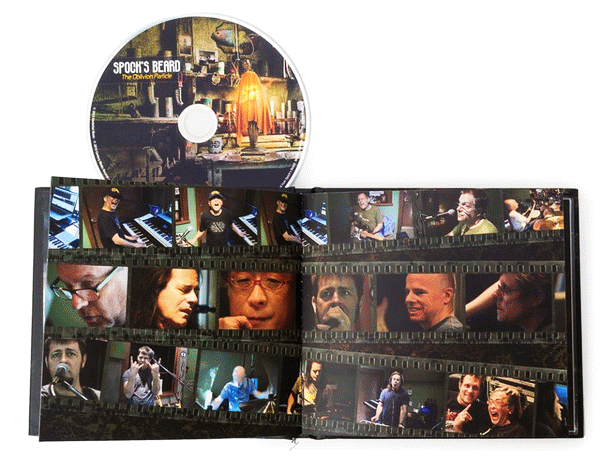
Speaking of experimentation, it doesn’t cease with the keyboards. Not content with being masters of their own instruments, ‘The Oblivion Particle’ sees Alan Morse introduce the autoharp, banjolele, electric sitar and mandolin to his repertoire and drummer Jimmy Keegan takes up lead vocal duties for the first time on ‘Bennett Builds A Time Machine’ meaning that every member of the quintet now contributes vocals to the music, another huge string to the Spock’s Beard metaphorical bow.
The highlight of ‘Hell’s Not Enough’ is flamboyant drumming from Keegan that drives the closing crescendo with real power thus completing the transformation within the composition, which steadily builds from a quiet, understated acoustic opening to an entirely different beast altogether.
One of my personal highlights on the album is the aforementioned ‘Bennett Builds A Time Machine’. It can only be described as a bright and breezy composition with an extended, slightly darker instrumental work-out in the mid-section. The whole song is fantastic, with a properly uplifting, feel-good factor to it.
More highlights can be found within each and every one of the tracks on ‘The Oblivion Particle’ but to name a few, there’s the more straight-up hard rock attitude of ‘Get Out While You Can’, or the utterly stunning and majestic ‘The Centre Line’ which is driven by a galloping tempo and which contains yet more delicious melodic hooks as well as some peerless musicianship.
‘To Be Free Again’ is arguably the most epic track on the record. It offers a groovy, chunky riff that’s simply brilliant before changing styles almost entirely, straying into territory that’s the most cinematic and atmospheric anywhere on the record.
The record is then closed out by ‘Disappear’. The chorus is sublime, containing possibly the most immediate hooks on the album as well as interesting violin embellishments from guest and Kansas maestro David Ragsdale. It conveys more in the way of positivity too, ending the album on a note of genuine hope and you left feeling happy, content and somehow enriched by the whole experience.
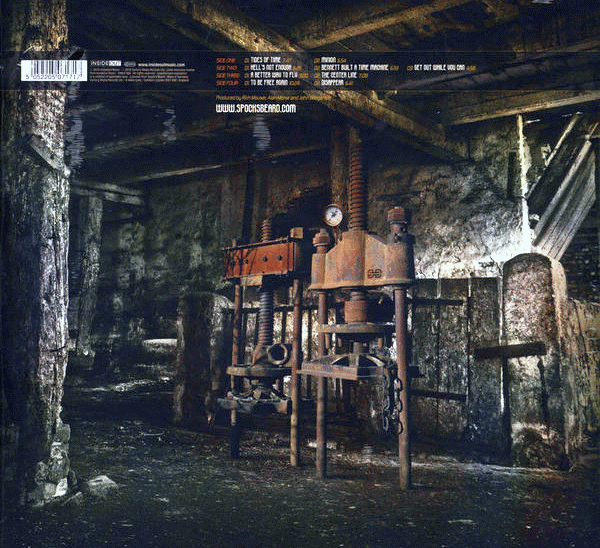
As you might expect from Spock’s Beard, every piece of music contains within it a myriad of sounds, styles and influences from across the musical spectrum, but it is the way in which all the ideas are fused together into a cohesive and digestible whole which sets this group of musicians apart from others.
The entire record feels well thought-out, smooth and sufficiently accessible despite their willingness to play around with everything from pop to hard rock, from fusion to classical. It should sound messy and disjointed but it never does.
‘The Oblivion Particle’ is the sound of Spock’s Beard at the very top of their game. Frankly, I’m not entirely sure that ‘classic’ melodic progressive rock can get much better than this. All is truly superb.
An album that proves Spock’s Beard to be an amazingly compelling band some 20+ years after their formation, and one that continues to be a leader in the prog rock field, just as they have always been.
Very, Highly Recommended.
01 – Tides Of Time
02 – Minion
03 – Hell’s Not Enough
04 – Bennett Built a Time Machine
05 – Get Out While You Can
06 – A Better Way To Fly
07 – The Center Line
08 – To Be Free Again
09 – Disappear
Ted Leonard – lead vocals
Alan Morse – guitar, vocals, autoharp, mandolin
Dave Meros – bass, vocals
Ryo Okumoto – keyboards, synths, vocals
Jimmy Keegan – drums, lead vocal (4)
David Ragsdale (Kansas) – violin (9)
Matt Spall – words
BUY IT !
www.amazon.de/Oblivion-Particle-SpockS-Beard/dp/B01167X3HW
.

